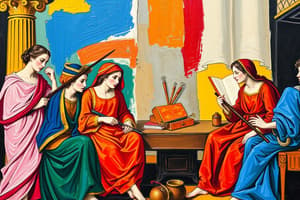Podcast
Questions and Answers
What does the term 'classic' typically refer to?
What does the term 'classic' typically refer to?
- Something that is outdated
- The first or best of its kind (correct)
- A generally popular book or movie
- An artistic style exclusive to the Greeks
Which of the following is NOT one of the aesthetic principles of classicism produced by the Greeks?
Which of the following is NOT one of the aesthetic principles of classicism produced by the Greeks?
- Balance
- Clarity
- Harmonious proportion
- Complexity (correct)
Heinrich Schliemann is known for uncovering artifacts from which ancient civilization?
Heinrich Schliemann is known for uncovering artifacts from which ancient civilization?
- Trojan
- Greeks
- Minoans
- Mycenaeans (correct)
What is the notable aspect of the Minoan civilization discovered by Sir Arthur Evans?
What is the notable aspect of the Minoan civilization discovered by Sir Arthur Evans?
Which legendary creature is associated with the Minoan civilization?
Which legendary creature is associated with the Minoan civilization?
How were the Mycenaeans different from the Minoans?
How were the Mycenaeans different from the Minoans?
What are the titles of the two epic poems about the war between Mycenae and Troy?
What are the titles of the two epic poems about the war between Mycenae and Troy?
Who is traditionally recognized as the author of The Iliad and The Odyssey?
Who is traditionally recognized as the author of The Iliad and The Odyssey?
What was the primary role of Zeus in Greek mythology?
What was the primary role of Zeus in Greek mythology?
Which Greek goddess is associated with wisdom and war?
Which Greek goddess is associated with wisdom and war?
What was the significance of the Greek Golden Age period, spanning 480-430 BCE?
What was the significance of the Greek Golden Age period, spanning 480-430 BCE?
What impact did geography have on ancient Greek city-states?
What impact did geography have on ancient Greek city-states?
Which alliance was formed by the Greek city-states after the Persian Wars?
Which alliance was formed by the Greek city-states after the Persian Wars?
Who is recognized as the father of history?
Who is recognized as the father of history?
What did the term 'democracy' originate from in Greek?
What did the term 'democracy' originate from in Greek?
Which events brought the Greek Golden Age to an end?
Which events brought the Greek Golden Age to an end?
What was the estimated number of citizens in Athens compared to its total population?
What was the estimated number of citizens in Athens compared to its total population?
In Greek mythology, who was Deucalion?
In Greek mythology, who was Deucalion?
Flashcards are hidden until you start studying
Study Notes
Definition of "Classic"
- Refers to something recognized as the first or best of its kind.
Aesthetic Principles of Classics
- Emphasizes clarity, simplicity, balance, regularity, and harmonious proportion.
Classicism Ideals
- Characterized by reason, moderation, and dignity.
Archaeological Discoveries
- Heinrich Schliemann discovered artifacts of ancient Troy and the Mycenaean civilization, which established on the Greek mainland around 1600 B.C.E.
- Sir Arthur Evans uncovered the Minoan civilization on Crete, named after the mythical King Minos.
Minoan Legends
- The most famous legend features a half-man, half-bull creature born from the union of Minos' queen and a sacred white bull.
Differences Between the Mycenaeans and Minoans
- Mycenaeans were more aggressive and fought for control over the eastern regions, unlike the Minoans.
Epic Poems of the Trojan War
- Epic poems "The Iliad" and "The Odyssey" narrate the ten-year conflict between the Mycenaeans and Troy.
Authorship of Epic Poems
- Traditionally attributed to the poet Homer, though there is uncertainty regarding his existence and time.
Greek Deities
- Zeus: God of the sky and ruler of deities.
- Hera: Ruler of deities.
- Poseidon: God of the sea.
- Apollo: God of light, medicine, and music.
- Dionysus: God of wine and vegetation.
- Athena: Goddess of wisdom and war.
- Aphrodite: Goddess of love, beauty, and procreation.
Deucalion
- Resembles the Greek Noah; built a boat to survive Zeus's flood.
Greek Views on Life After Death
- Life after death was not primarily regarded as a religious concept.
Classical Greeks' Identity
- They called their country "Hellas" and themselves "Hellenes."
Impact of Greek Geography
- Geography fostered the development of independent city-states due to mountainous terrain and travel interruptions.
Unity Against Enemies
- Greek city-states typically quarreled but united against Imperial Persia.
First Historian
- Herodotus is recognized as the "father of history."
Greek Golden Age
- Spanning 480-430 BCE, known for cultural and political achievements following the Persian Wars.
Uniqueness of Athens
- Athens emerged as a leading power after claiming victory in the Persian War.
Meaning of Democracy
- Derives from Greek terms "demos" (people) and "kratos" (power), meaning government by the people.
Athenian Citizenship
- Estimated 40,000 landowning men qualified as citizens from a population of 250,000; women, slaves, and foreigners were excluded.
Delian League
- Alliance of city-states formed post-Persian Wars.
End of the Golden Age
- Concluded with the defeat of Athens.
Historian of the Peloponnesian War
- Thucydides documented this conflict.
First Olympic Games
- Held in 776 B.C.E. as part of the Panhellenic Festival.
Origins of "Stadium" and "Gymnasium"
- "Stadium" comes from "Stadion," a reference to a 200-yard sprint.
- "Gymnasium" derives from "Gymnos," meaning naked, related to athletic training.
Studying That Suits You
Use AI to generate personalized quizzes and flashcards to suit your learning preferences.




